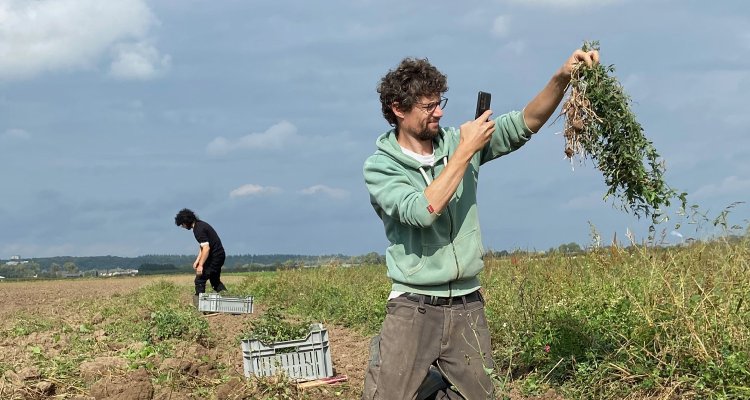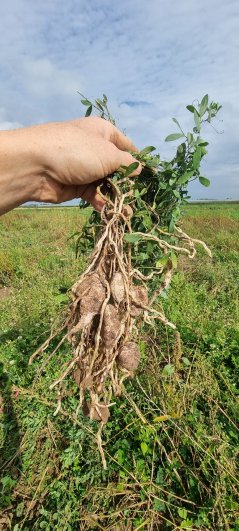
Interview
Alumnus Pádraic Flood, founder of Aardaia: ‘Aardaker has the potential to become a protein potato’
In 2009, botanist Pádraic Flood moved from Ireland to the Netherlands to pursue a PhD. In Wageningen, he learned all about genetic variation in plant photosynthesis. To contribute to a more sustainable food supply, Flood founded his own company and decided to dig up a promising, long-forgotten crop called aardaker.
Pádraic Flood studied Botany in Dublin. In his search for a PhD in the field of photosynthesis or plant systematics, he found an interesting research project in Wageningen. ‘I had never heard of WUR before, to be perfectly honest. It was only later that I discovered that it is a global epicentre for plant science, food science and agriculture. Wageningen is quite famous among researchers and in the global south, but not many people know it in Ireland.’
I was the only PhD student who thought the Dutch weather was a huge improvement.
‘My research was about genetic variation in photosynthesis. We found lots of variation in the photosynthetic capacity of the plants we studied. For the most part, I really enjoyed my PhD. It was challenging at times, but I appreciated the Dutch system: you get paid properly and you get holidays. The resources are great too, and there are lots of smart, passionate people around. So it’s an excellent environment to develop yourself intellectually. And I was the only PhD student who thought the weather was a huge improvement! It’s less rainy and windy in the Netherlands than in Ireland.’
18.000 kilometres to find a plant
‘After my PhD, I pursued a postdoc at the Max Planck Institute in Cologne. My research was about a plant that you can find everywhere, Arabidopsis thaliana. But we know more about its inner workings than any other plant in existence. We know little of how it behaves in the wild. I went looking for it in Africa and beyond, to learn more about the genetic differences between Arabidopsis in different regions. I travelled more than 18.000 kilometres to find the different populations, from South Africa to Saudi Arabia and from sea level to over 4.500 metres in altitude.’
Flood returned to Wageningen with his family in late 2019, when his wife got a new job here. He found a research position at WUR in May 2020 – and then the COVID pandemic broke out. ‘That pandemic completely changed my outlook. It struck me that the international community couldn’t get itself organized for an acute global crisis. I began to wonder what hope we had against the chronic, slowly unfolding disaster of climate change and ecosystem collapse that is much more complex. So I decided to pivot away from fundamental research and use my career to contribute to a more sustainable and resilient future.’
Underground potential of the aardaker
‘We have to secure a more sustainable food supply. That is what I want for my children, my family, for the future. A great starting point, in my mind, is to look at the incredible potential in the biodiversity around us. There are around 20.000 species of plants that we can eat, but the industrialisation of agriculture has us focussing on just a few crops. Wheat, rice and maize make up more than half of the world’s food energy. Pigs on Dutch farms get fed with soy from Brazil, which causes deforestation. So our current food system is contributing to ecosystem collapse and climate change.’
This is where the aardaker comes in. The aardaker is a tuber, similar to potatoes and cassavas. It’s a forgotten food, but it has been around in Europe for thousands of years. ‘It was actually cultivated in Zeeland in the 18th century! And it has a lot of potential. Most importantly, it contains a lot of protein – unlike potatoes. Furthermore, aardaker can make its own nitrogen fertiliser from the air, which is great for a country like the Netherlands with a nitrogen crisis. The combination of the yield potential of potato and the protein potential of soy or peas is unique. This allows the aardaker to occupy a new crop category: the protein potato.’

‘In July 2023, I founded my own company: Aardaia. I’ve planted half a hectare of aardaker in a field close to Wageningen. I use the harvest for both plant breeding and production. Most of the produce is sold to a Michelin-star restaurant in Nijmegen. I use the rest for plant breeding. Some tubers weigh just 5 grams, while the best ones can weigh up to 175 grams. So there’s a lot of potential to seek out the genetic composition that yields the best results. In theory, the yield of aardaker could be really high, as high as that of potatoes.’
A special place
‘Wageningen is a great place for my company. There’s a lot of talent in this region. Working here is generally very good, although overhead and wages are obviously high. But we definitely like it here, it manages to combine the cultural diversity of a big city with a cosy small-town vibe. Wageningen is a very special place, we feel very luck to live here.’
Pádraic Flood in short
- Studied Botany at University College Dublin
- 2009-2014: PhD in Plant Sciences, WUR
- 2014-2020: Postdoc at the Max Planck Institute for Plant Breeding Research
- 2020-2021: Researcher at the Department of Plant Breeding, WUR
- 2021-2024: Team lead and director of science at INFARM
- July 2023: Founder of Aardaia